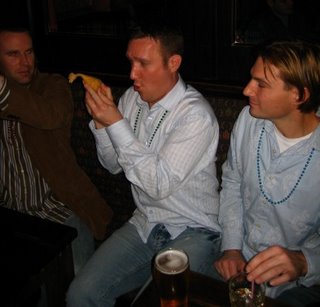 Euchre QOD: “I don’t care, ya gotta declare”
Euchre QOD: “I don’t care, ya gotta declare”Euchre Haiku:
Probabilities
Follow them to win often
But sometimes they lose
Euchre Palaver
“Game Theory” – Mathematical equations meant to explain the best strategy in a situation based on the probability of an event occurring and the payoff that one receives. It is the basis for the point system of evaluating your cards.
Savvy Strategies
When I was first thinking about a better strategy for euchre, I thought of creating a computer program to play thousands of games and then keeping track of how it did. To get a sense of the value of each card I used a simple program to figure out the probability that any specific card would win a trick. To make it “nearly” realistic I put the following rules in place.
0. The playing rules for euchre were in effect. Follow suit, trump wins, etc.
1. The lead trick would be the card with the highest rank. So, the highest trump that a player had would be led at the first trick.
2. Each player would play the highest card in the suit to win if they could. That means if an off-suit was led and the computer had to decide between an Ace and a lower card, the ace was played.
3. Each player would play the lowest trump if they were ruffing. So, if they had the right bower and the nine of trump, they would play the nine if ruffing.
4. One player would not play higher than their partner (unless their was no choice) if their partner was winning the trick.
5. The result of the tricks were saved noting which card won.
6. A number of hands were randomly dealt and played.
Clearly, this isn’t a great euchre strategy but it gives a close approximation to a real game.
The results of this simulation using 100 hands are as follows…
Card Probability of winning
Right bower 100%
Left Bower 76%
Ace of trump 53%
King of trump 45%
Queen of trump 40%
Ten of trump 34%
Nine of trump 32%
Ace of next suit 44%
King of next suit 13%
Queen of next suit 2%
Ten of next suit 1%
Nine of next suit 1%
Ace of green suit 50%
King of green suit 19%
Queen of green suit 6%
Jack of green suit 1%
Ten of green suit 1%
Nine of green suit <1%
The results of this quick experiment are interesting. Clearly, there is a difference between a “green” Ace and a “next” Ace. You can also see that an Ace of trump is only slightly more valuable than a green Ace.
To create the point system, the probabilities are simplified. This has the effect of giving up some accuracy but it also makes things a bit easier.
The next step would be to improve the play of the computer opponents and take into account things like lone Aces being worth more than doubleton Aces, guarded left bowers, etc.
In the end, there could be a point system which perfectly describes every euchre hand possible. Then only an expert or someone really lucky could beat a computer euchre player.

7 comments:
Wow. Awesome article. Please do more articles like this in the future. Very informational and knowledgeable. I will expect more from you in the future. For now i will just bookmark your page and surely I'm gonna come back later to read more. Thank you to the writer!
www.imarksweb.org
the other day while playing Euchre we had a hand where there was 3 Jacks in the blind and the 4th Jack turned up. I've played for almost 50 years and have never seen that before and was wondering if anyone could tell me the odds of that happening
So:
Right 10
Left 8
Trump Ace 5
Trump King 4
Trump Queen 4
Trump Ten 3
Trump Nine 3
Green Suit Ace 5
Green Suit King 2
Next Suit Ace 4
Next Suit King 1
How many pts is the cutoff for calling it? I got euchred with an 18-pt hand last night, so 20?
@MHults - The point system is not a guarantee that you won't get euchred. I've been euchred with both bowers (20 points).
Points simply give you a sense of how many tricks you are likely to get. With 18 points I'd guess you'll get euchred about 15-20% of the time. With 20 points you might get euchred 10% of the time. I'd say 18 points is probably a good guide for ordering.
Does anyone know what is a typical euchre percentage? Guessing in the 15-20% range, but wondering if anyone has an actual stat.
If you never get euchred, you aren't calling it enough. Think of it mathematically, if you call a weak hand, say K 10 9 four times and make it three times and get euchred once, you will have outscored your opponents 3-2 at minimum.
There are also other factors to consider, including the fact that you might call it into your partners hand and get all five tricks. Another scenario is that you called it and got euchred, but had you passed, your opponent would have called it and made it anyways and scored a point, so you only really cost yourself one point.
Do you have the code for the program and could you please share it? It would be really interesting to play with the strategy! Anyway thanks for the article very interesting!
Post a Comment